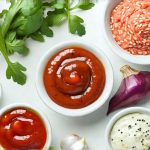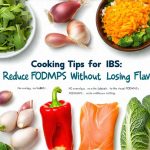Indigestion is an incredibly common experience, impacting people of all ages and dietary habits. While often mild and temporary, persistent indigestion can significantly disrupt daily life, causing discomfort and affecting overall well-being. Often overlooked as a culprit are the seemingly innocuous additions to our meals: sauces and condiments. These flavorful enhancers, while adding depth and enjoyment to food, frequently contain ingredients that trigger or exacerbate digestive issues in susceptible individuals. Understanding why this happens and learning practical strategies for managing indigestion related to sauces and condiments is crucial for maintaining comfortable digestion and continuing to enjoy your favorite foods.
The issue isn’t necessarily the sauces themselves but rather their composition. Many commercially produced sauces are high in fat, sugar, salt, and acidity – all known triggers for indigestion. Spiciness can also play a role, as capsaicin, the compound that gives chili peppers their heat, can stimulate acid production in the stomach. Furthermore, certain ingredients like garlic, onions, tomatoes (in large quantities), or even artificial additives might cause discomfort for those with sensitivities. Identifying personal triggers and learning to manage portion sizes or choose alternative options are key steps toward minimizing indigestion caused by these culinary staples. If underlying conditions are contributing to your digestive issues, explore resources on manage anxiety.
Understanding the Digestive Impact of Common Sauces & Condiments
Sauces and condiments aren’t just about flavor; they profoundly impact how our bodies digest food. The high fat content in many sauces, for example, slows down gastric emptying – the rate at which food moves from the stomach to the small intestine. This can lead to bloating, fullness, and a general feeling of discomfort. Sugary sauces contribute to fermentation within the digestive tract if not properly processed, potentially causing gas and cramping. Similarly, excessive salt intake can disrupt the delicate balance of fluids in the body, leading to water retention and further digestive upset. It’s important to recognize that individual sensitivities vary greatly, meaning a sauce that bothers one person may be perfectly tolerated by another. Understanding indigestion during stressful times can also provide valuable insight into managing your symptoms.
Acidity is another significant factor. Tomato-based sauces, vinegar-heavy dressings, and citrusy marinades can all increase stomach acidity, potentially triggering heartburn or acid reflux in those prone to these conditions. Even seemingly mild condiments like mustard contain acetic acid which can contribute to digestive distress for some. Beyond the basic chemical properties of ingredients, additives such as artificial sweeteners, preservatives, and emulsifiers are increasingly suspected of contributing to gut health issues and subsequent indigestion. These often-unseen components can disrupt the natural microbiome balance within the digestive system. If you suspect your symptoms relate to acid reflux, learning about GERD with esophagitis may be helpful.
Finally, spice levels play a major role. Capsaicin, found in chili peppers and many hot sauces, stimulates acid production and can irritate the stomach lining. While some individuals enjoy this sensation, others experience significant discomfort including heartburn and diarrhea. The key takeaway is that a wide range of ingredients commonly found in sauces and condiments can contribute to indigestion, making it crucial to identify personal sensitivities and adjust consumption accordingly.
Strategies for Minimizing Indigestion from Sauces & Condiments
Managing sauce-related indigestion isn’t about complete elimination—it’s about mindful consumption and informed choices. One of the most effective strategies is portion control. Using sauces as enhancements rather than dominant components of a meal can significantly reduce their impact on digestion. Instead of drenching your food, opt for smaller amounts or even dipping instead of pouring. This allows you to enjoy the flavor without overwhelming your system. Consider diluting concentrated condiments with water or other neutral liquids to lessen their intensity and potential for irritation.
Another approach is choosing alternatives. Homemade sauces often allow for greater control over ingredients, enabling you to reduce sugar, salt, and fat content while avoiding potentially problematic additives. Look for brands that prioritize natural ingredients and minimal processing. Exploring different flavor profiles can also be beneficial. If tomato-based sauces consistently cause issues, try pesto (in moderation), herb-infused oils, or lighter vinaigrettes. Don’t be afraid to experiment with spices and herbs to create your own flavorful alternatives. Finally, timing is crucial; avoid consuming large amounts of acidic sauces on an empty stomach, as this can exacerbate irritation. For chronic indigestion issues consider looking into dyspepsia.
Identifying Your Personal Triggers
Pinpointing the specific sauces or condiments that cause you distress requires a bit of detective work. Keep a food diary for a week or two, meticulously recording everything you eat and drink, including all sauces and condiments used. Note any digestive symptoms experienced – bloating, gas, heartburn, stomach pain, diarrhea, etc. – and when they occur in relation to your meals.
- Be specific: Don’t just write “indigestion.” Describe the symptom (e.g., “burning sensation in chest after dinner”).
- Look for patterns: Do symptoms consistently arise after consuming a particular sauce or condiment?
- Consider ingredient lists: Analyze the ingredients of problematic sauces to identify potential culprits – high fat, acidity, spice levels, artificial additives.
This process may reveal surprising sensitivities. For instance, you might discover that while chili peppers themselves don’t bother you, a specific hot sauce with added vinegar causes significant discomfort. Once identified, these triggers can be avoided or consumed in smaller quantities. Remember to consult with a healthcare professional if your symptoms are severe or persistent. Understanding duodenal ulcer symptoms can also help you differentiate between indigestion and more serious conditions.
The Role of Gut Health
A healthy gut microbiome is essential for optimal digestion and overall well-being. An imbalance in gut bacteria – often referred to as dysbiosis – can increase susceptibility to indigestion, making you more sensitive to triggers like those found in sauces and condiments. Supporting your gut health through dietary changes and lifestyle adjustments can significantly improve digestive resilience.
- Increase fiber intake: Fiber feeds beneficial gut bacteria.
- Incorporate probiotics: Found in fermented foods like yogurt, kefir, and sauerkraut, probiotics introduce healthy bacteria into the gut.
- Limit processed foods, sugar, and artificial sweeteners: These can disrupt the microbiome balance.
Consider consulting with a registered dietitian or nutritionist for personalized guidance on optimizing your gut health. A healthier gut is better equipped to process food efficiently and minimize digestive discomfort. Prioritizing gut health isn’t just about preventing indigestion; it’s about fostering overall wellness. If you suspect your liver may be playing a role, learn about fatty liver disease.
Mindful Eating Practices
Beyond dietary adjustments, adopting mindful eating practices can significantly reduce the risk of sauce-related indigestion. Eating slowly and thoroughly chewing your food aids digestion by breaking down food particles more effectively. This reduces the workload on your stomach and allows for better absorption of nutrients. Avoid distractions while eating – turn off the TV, put away your phone, and focus on savoring each bite.
- Pay attention to hunger cues: Eat only when you’re truly hungry, and stop when you’re comfortably full.
- Practice portion control: Use smaller plates and measure out sauces or condiments.
- Stay hydrated: Drinking water throughout the meal helps with digestion.
Mindful eating is about creating a positive relationship with food and paying attention to your body’s signals. By slowing down, chewing thoroughly, and being present during meals, you can enhance digestion and minimize discomfort—even when enjoying flavorful sauces and condiments. If you experience ongoing digestive issues consider exploring IBS.


















